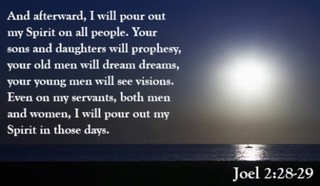
Change Translation
- Recent Translations
- All Translations
11
The Lord utters his voice at the head of his army; how vast is his host! Numberless are those who obey his command. Truly the day of the Lord is great; terrible indeed—who can endure it?
Joel 2:11 Meaning and Commentary
Joel 2:11
or numerous, as both the locusts and Chaldeans were: for [he is] strong that executeth his word;
or "strong is it"; namely, the camp and army of the locusts; which, though feeble in themselves, separately considered; yet being in such large bodies, and the Lord at the head of them, and strengthened by him, were able to fulfil his word; which he can make the least and meanest of his creatures do: or the Assyrian or Chaldean army, which was both numerous and mighty: which the Targum may refer unto, paraphrasing the words,
it?
the day appointed by the Lord to take vengeance on the Jews for sin; and this, being the day of his wrath, is very dreadful and intolerable; so any season may be called, in which God remarkably pours down his wrath on men of their sins; see ( Revelation 6:17 ) . Such was the time of Jerusalem's destruction, both by the Chaldeans and Romans.
FOOTNOTES:
F21 Ibid. (Nat. Hist. l. 11. c. 29.)
And the Lord shall utter his voice before his army
Either the army of the locusts, whom Pliny F21 calls "pestis deorum", "the plague of the gods"; and the Arabians frequently style them the army of God. It is a tradition of theirs that locusts fell into the hands of Mahomet, with this inscription on their backs and wings,
``we are the army of the most high God;''and because they were, for that reason Mahomet made a law that none should kill them; (See Gill on Revelation 9:3). These creatures are certainly at his beck and command; he can "command the locust to devour the land", ( 2 Chronicles 7:13 ) ; which may be meant by his uttering his voice here; though Jarchi and Kimchi interpret it of the Lord's giving notice of this judgment by his prophets before it fame: or this may design the army of the Assyrians or Chaldeans, of which the locusts were all emblem, and which were of the Lord's mustering together, and was at his command; and who is here represented as a General at the head of his army, making a speech to them to animate and encourage them to the battle, and to give them the word of command when to begin the onset: for his camp [is] very great;
or numerous, as both the locusts and Chaldeans were: for [he is] strong that executeth his word;
or "strong is it"; namely, the camp and army of the locusts; which, though feeble in themselves, separately considered; yet being in such large bodies, and the Lord at the head of them, and strengthened by him, were able to fulfil his word; which he can make the least and meanest of his creatures do: or the Assyrian or Chaldean army, which was both numerous and mighty: which the Targum may refer unto, paraphrasing the words,
``for strong are the executors of his word:''for the day of the Lord [is] great and very terrible, and who can abide
it?
the day appointed by the Lord to take vengeance on the Jews for sin; and this, being the day of his wrath, is very dreadful and intolerable; so any season may be called, in which God remarkably pours down his wrath on men of their sins; see ( Revelation 6:17 ) . Such was the time of Jerusalem's destruction, both by the Chaldeans and Romans.
F21 Ibid. (Nat. Hist. l. 11. c. 29.)
Taken from John Gill's Exposition of the Bible
Unlock Deeper Insights: Get Over 20 Commentaries with Plus! Subscribe Now
Joel 2:11 In-Context
9
They leap upon the city, they run upon the walls; they climb up into the houses, they enter through the windows like a thief.
10
The earth quakes before them, the heavens tremble. The sun and the moon are darkened, and the stars withdraw their shining.
11
The Lord utters his voice at the head of his army; how vast is his host! Numberless are those who obey his command. Truly the day of the Lord is great; terrible indeed—who can endure it?
12
Yet even now, says the Lord, return to me with all your heart, with fasting, with weeping, and with mourning;
13
rend your hearts and not your clothing. Return to the Lord, your God, for he is gracious and merciful, slow to anger, and abounding in steadfast love, and relents from punishing.
New Revised Standard Version Bible, copyright 1989, Division of Christian Education of the National Council of the Churches of Christ in the United States of America. Used by permission. All rights reserved.
